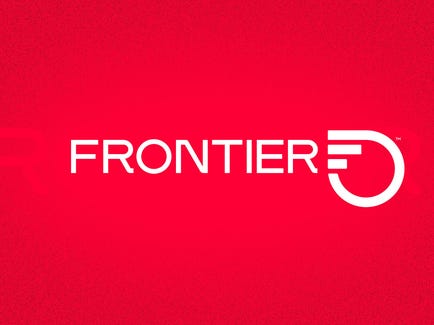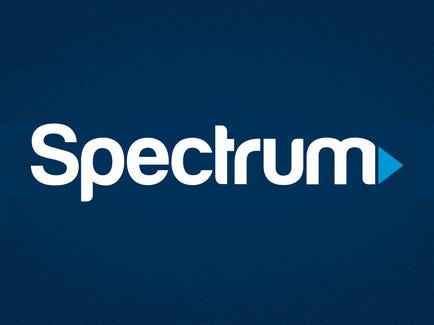Frontier vs. Spectrum: What's the Better Choice for Home Internet?
The decision will likely come down to the connection type, fiber or DSL, you can get with Frontier. Here's how Frontier and Spectrum compare.


We can't just get any home internet service we want, unfortunately. Limited service areas often keep our options to two, maybe three plausible internet options. While more choices would be nice, the option of Frontier Communications or Charter Spectrum isn't necessarily a bad one to have. Both providers offer decent speeds, particularly if Frontier Fiber is available at your address, and come with simple pricing that includes unlimited data and no contract requirements.
If you're trying to decide between Frontier and Spectrum for your home internet needs, we're here to help. Keep reading to look closely at how the two providers stack up in terms of technology, speeds, coverage and customer satisfaction.
Frontier
Green light for fiber, but if DSL, go elsewhere
Our take - Frontier's fiber internet service is helping the company make positive strides in customer satisfaction studies. While the company's DSL service scored a paltry 61 out of 100 in the most recent American Customer Satisfaction Index, Frontier Fiber nabbed a 74 score, well above the industry average of 68.
Spectrum
Consistent, straightforward cable internet
Our take - Spectrum Internet, Charter Communications' broadband service, features competitive rates, unlimited data, no contracts and a minimal ($7) equipment fee. While the upload speeds can't compete with fiber internet, customers will experience more consistent performance with cable internet than any DSL plans.
How do Frontier and Spectrum match up on technology and speeds?
There are multiple methods internet providers can use to deliver internet connectivity to people's homes. Fiber is often the fastest option, but it's only available in neighborhoods equipped with ground-laid fiber-optic cable, and rollouts like those are slow going.
Locating local internet providers
Frontier offers fiber internet in 15 states, covering about one-third of the company's customers, as per the Federal Communications Commission. The rest of Frontier's customers get online with a much slower, copper-based DSL connection.
Meanwhile, Charter only offers Spectrum fiber service to less than 1% of its customer base, and it doesn't offer DSL service at all. Instead, the company gets 99% of Spectrum users online via coaxial cable connection. In fact, Charter Spectrum is the nation's second-largest cable provider. The infrastructure it acquired after purchasing Time Warner Cable in 2016 plays a big role there.
Locating local internet providers
With cable internet, download speeds will typically come in at a few hundred Mbps, though Spectrum's fastest plans can go as high as 940Mbps.
Frontier vs. Spectrum on internet plans and pricing
That brings us to plans -- here's a look at what both companies have to offer:
Frontier Internet plans
| Plan | Speeds | Promo rate (first year) | Equipment fee | Data cap |
|---|---|---|---|---|
|
Frontier Internet (Copper) Read full review | Varies | $55 | None | None |
| Fiber 500 | Up to 500Mbps download, 500Mbps upload | $50 | None | None |
| Fiber Gig | Up to 940Mbps download, 880Mbps upload | $70 | None | None |
| Fiber 2 Gig | Up to 2Gbps download, 2Gbps upload | $100 | None | None |
| Fiber 5 Gig | Up to 5Gbps download, 5Gbps upload | $155 | None | None |
Spectrum Internet plans
| Plan | First-year promo rate | Regular rate | Max speeds | Equipment fee | Contract |
|---|---|---|---|---|---|
|
Spectrum Internet Read full review | $50 | $75 | 300Mbps download, 10Mbps upload | Modem free; $5 for router (skippable) | None required |
|
Spectrum Internet Ultra Read full review | $70 | $95 | 500Mbps download, 20Mbps upload | Modem free; $5 for router (skippable) | None required |
|
Spectrum Internet Gig Read full review | $90 | $115 | 940Mbps download, 35Mbps upload | Modem free; $5 for router (skippable) | None required |
Download speeds reach as high as 5 gigabits per second with Frontier if you're eligible for fiber service, with matching or near-matching upload speeds, too. With Frontier DSL, download speeds are typically in the double digits, topping out at about 100Mbps.
With Spectrum, your cable internet speeds are pretty simple -- the company offers plans that start at 300Mbps and are capable of hitting downloads as fast as 940Mbps, just shy of gigabit speed. However, limited upload speeds are a common shortcoming with cable internet, and Spectrum is no exception. Even with the company's fastest plan, your uploads will be held to just 35Mbps.
As for prices, monthly costs for Frontier DSL service are around $55 per month, while the company's fiber plans range from $50-$155 per month. With Spectrum's cable plans, costs typically range from $50 to $90 per month, though the company generally includes fewer additional fees than competitors.
Both providers also offer access to discounted internet plans for qualified low-income customers. Charter has Spectrum Internet Assist, which offers download speeds of 30Mbps and upload speeds of 4Mbps with no contracts or data caps. Meanwhile, both Spectrum and Frontier participate in the government's Affordable Connectivity Program, which gives qualified customers a discount on existing Frontier or Spectrum internet service.
Both Frontier and Spectrum offer residential internet service throughout much of the continental US. Spectrum also offers internet service in Hawaii.
Frontier and Spectrum coverage and availability compared
With coverage across 46 states -- including Hawaii -- Charter Spectrum is one of the nation's largest internet providers. Frontier is smaller, but it's a major player, too, connecting people in 25 states. The two services overlap in several regions, including parts of New York, Texas, southern California, and the Midwest.
According to the FCC, Spectrum home internet was available to just over 100 million Americans at the end of 2020. Meanwhile, Frontier's customer base clocked in at 30 million.
Spectrum's customer satisfaction rating sits just below the overall average for the ISP category. Meanwhile, Frontier made the biggest jump from 2021 to 2022.
Frontier vs. Spectrum on customer satisfaction marks
So, how satisfied are Spectrum and Frontier customers after signing up for home internet service? According to the American Customer Satisfaction Index, which lists yearly benchmarks on the topic across a wide range of categories, including internet providers, the answer is that there's some definite room for improvement.
Of the two, Spectrum ranked higher, earning an overall satisfaction score of 63 out of 100 from the customers the ASCI surveyed for its 2022 report. That's still a point below the overall category average of 64 and well below Verizon Fios, which led all providers with a score of 72.
As for Frontier, the company had finished near the bottom in previous years but saw the greatest positive increase in 2022 of any ISP. That's the good news. But it's tempered by the fact that Frontier's 61/100 was still three points below the industry average... and two points behind Spectrum. Positive momentum, to be sure, but still, work to be done.
Are there other considerations between Frontier and Spectrum?
There are a few other key points to keep in mind as you compare internet service from Frontier and Spectrum. Here's a quick rundown.
Bundles
Both Spectrum and Frontier offer additional services like TV and home phone that you can bundle with your home internet plan at a potential discount. It's worth considering whether a bundle like that might be a good fit for you -- here's a helpful guide on bundling that'll let you know what to look for.
Contracts, fees and rising costs
Don't forget about taxes and fees, which are mostly unavoidable as you shop for an internet plan. Your specific fees will depend on your plan, but know that Frontier's equipment rental costs are factored into the base price. With Spectrum, your modem rental is free, but you'll need to pay $5 a month to rent one of the company's routers.
Neither Frontier nor Spectrum's internet plans require a long-term contract, so you can cancel at any time without fear of penalty.
Data caps
Neither Frontier nor Spectrum enforces data caps with any of their internet plans, so you can feel free to browse, stream and game online as much as you like without fear of incurring extra charges.
Privacy policies
You generate data whenever you use the internet, so it's worth considering what your ISP does with that data. Both Frontier and Spectrum list information to that end in their respective privacy policies, each of which is less intimidating to read through than you might expect.
Frontier's privacy policy clarifies that the company gathers usage data, including browsing history and viewing habits. Along with letting Frontier manage its network and billing, the stated purpose of that data collection is "to better understand our customers and market our services, as well as to deliver relevant advertising."
Frontier discloses that it may share data that can identify you with select third parties, but adds that it requires those agents and vendors to use that data as Frontier directs, and in full accordance with Frontier's policies for keeping it secure.
"We do not otherwise share your personal information," Frontier's policy states. "We may, however, share anonymous or aggregate information with third parties, including to improve how we provide service to existing and potential customers."
Frontier maintains an internal Do Not Call list for customers who wish to opt out of marketing calls. You can put your phone number on it by calling 800-921-8101. To opt out of marketing emails, send a message requesting to unsubscribe to privacy@ftr.com.
Meanwhile, Spectrum's privacy policy acknowledges that Charter gathers usage data and third-party data to refine its services and recommendations. It also commits that Charter will not sell personally identifiable information to anyone for any purpose. That includes your browsing history, call records and viewing activity.
"We do not sell or otherwise share information that personally identifies our customers... to third parties for those third parties' own use, such as marketing or advertising of their own products and services," Spectrum's privacy policy reads. "While we have no plans to do so, if we ever changed this business practice, we would provide customers with advance notice and obtain their express consent."
You can also visit Spectrum's privacy preferences page to opt out of sales calls, marketing emails and promotional mail.
Frontier vs. Spectrum FAQs
What's the difference between Frontier and Spectrum?
One of the most important differences between Spectrum and Frontier is how they deliver the internet to your home. Spectrum's internet service is almost exclusively through cable connections, while Frontier delivers the internet via DSL or fiber, depending on one's address. That means Spectrum service will be consistent no matter where you're located -- you'll have three plan options, ranging from 300Mbps to 940Mbps. On the other hand, Frontier offers much slower speeds if all you can get are its DSL plans (approximately 9-100Mbps), but potentially faster options (up to 5,000Mbps) if your address is serviceable for Frontier Fiber service.
Does Spectrum or Frontier offer fiber service?
Spectrum's internet service is delivered strictly via cable connections across the US. On the other hand, according to the FCC, Frontier offers fiber internet service to approximately a third of its national footprint across 15 states. Its Frontier Fiber product features speed tiers of 500, 940, 2,000 and 5,000Mbps.
Should I switch from Frontier to Spectrum?
That depends. If you're currently getting Frontier DSL service (which tops out at max download speeds of 115Mbps), it probably makes sense to switch to Spectrum, whose slowest plan is 300Mbps. Though, you wouldn't be looking at an upgrade if you're currently subscribed to Frontier Fiber, which provides symmetrical download speeds (which Spectrum can't match). So, in that scenario, a change doesn't make much sense.
Home Internet Guides
- Sometimes a provider is available in your Zip code, but not at your exact address
- See what exact plans are available at your home


